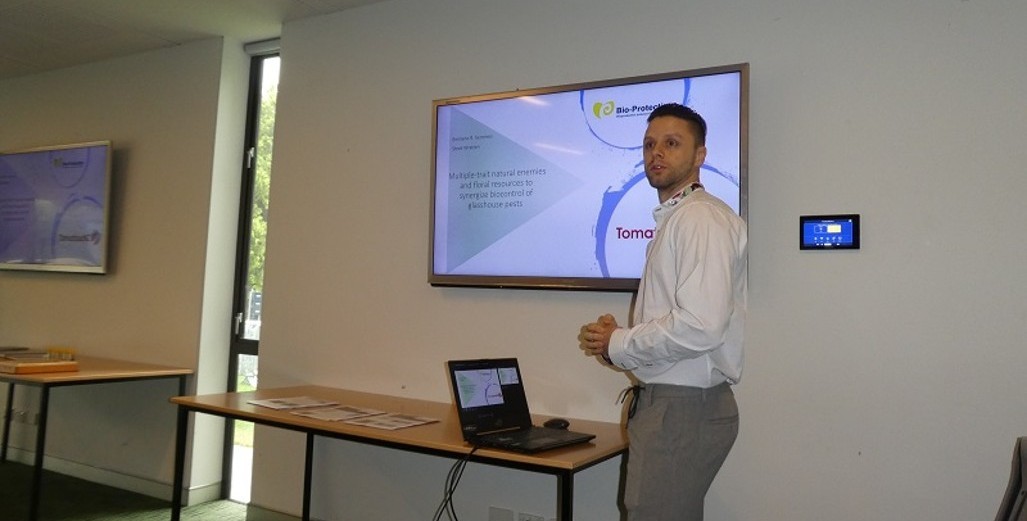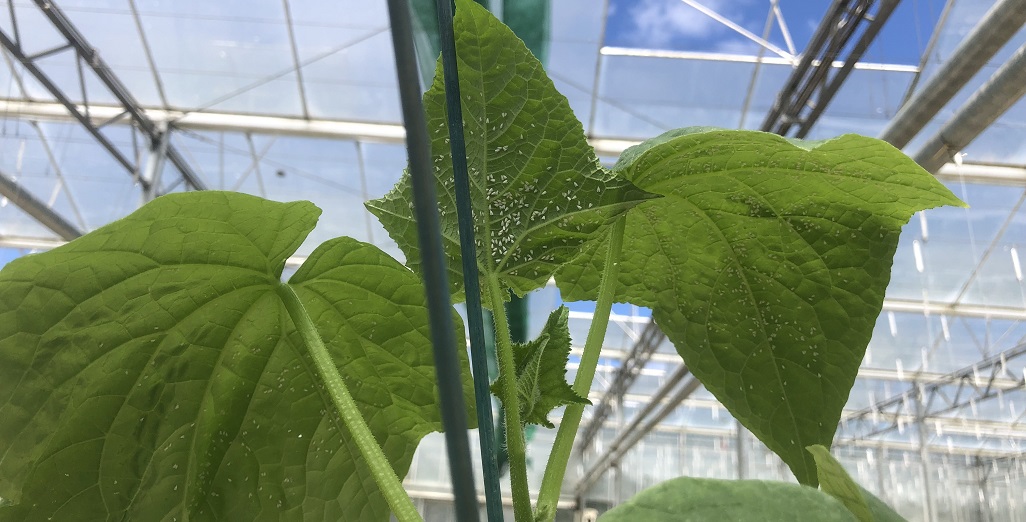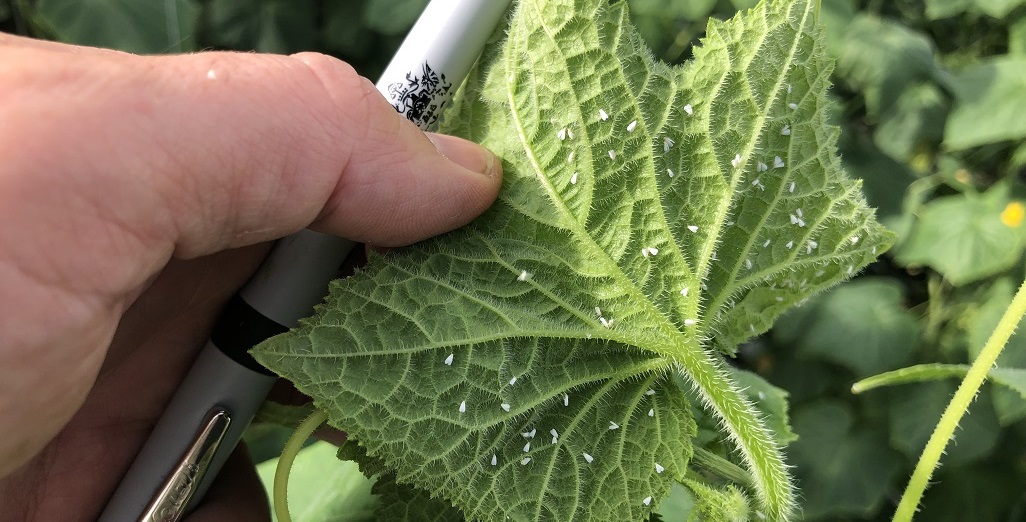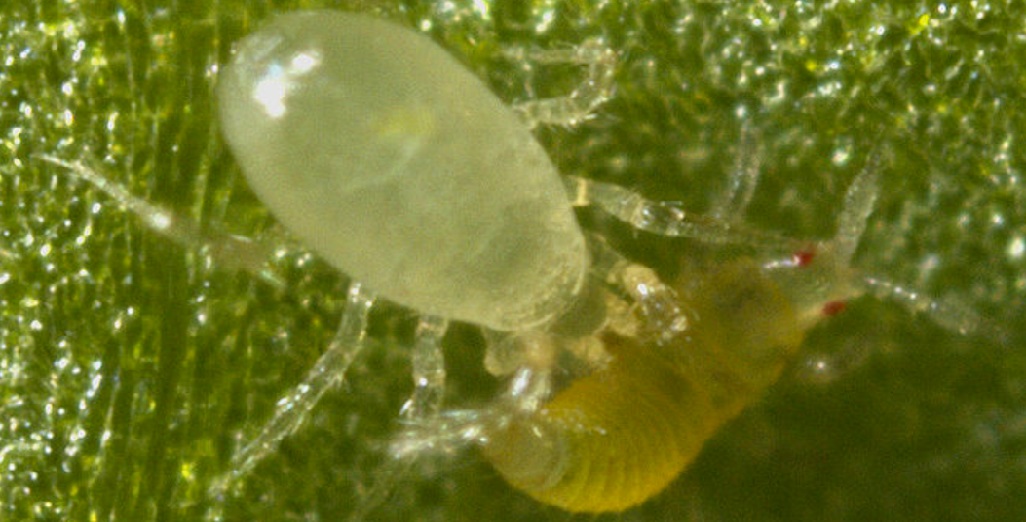Sign up here to subscribe to the Grower2grower Ezine. Every two weeks you will receive new articles, specific to the protected cropping industry, informing you of industry news and events straight to your inbox.
Feb 2020
Biocontrol Research Update

Emiliano Veronesi, Lincoln University
Last week as part of the TomatoesNZ board I attended an update on the work Lincoln University have been carrying out looking at biological IPM controls for the Tomato Potato Psyllid concentrating on the two biological control agents Tamarixia Triozae and Engytatus Nicotianae. Emiliano Veronesi a PH student presented the update to over 40 growers and suppliers to the industry.
The main strategy against TPP has been the prophylactic application of broad-spectrum chemical insecticides. This project looked at Biological Control Agents (BCAs). TomatoesNZ has contributed to this project on behalf of its grower members who at times may be severely impacted from TPP.
TPP and Biocontrol:
No biocontrol agents are being used to date against TPP in most commercial tomato greenhouses. One main point picked up on was that currently no biocontrol agents successfully interact with all TPP’s life stages and there is possible lack of resources necessary for the biocontrol agent to reproduce and thrive.
Emiliano and Lincoln staff wanted to test another potential BCA, Engytatus Nicotianae and its effectiveness on TPP. In trials conducted it was observed that from the egg and five different life stages of TPP that Tamarixia had good effects on the later life cycle 4 and 5 where and Engytatus worked well on the egg stage up to life cycle stage 4 on TPP. This initial finding using petri dish essays showed good TPP consumption by the Engytatus and 0% Engytatus mortality.
The findings from the petri dish essays encouraged the team at Lincoln to carry out larger scale tests using whole tomato plants grown for 6 weeks in individual netted cages. Four types of experiments were carried out including a control, TPP only, Engytatus only, and the most important TPP + Engytatus. In the 7 cages that had both TPP + Engytatus, four cages prevented TPP from settling and in the other 3 cages Engytatus markedly reduced TPP numbers and delayed its outbreak. Plants in this group produced on average the same flowers and fruit the control plants did. The result was Engytatus successfully controlled the TPP pest in this experiment.
What happens now:
The next step will be to use a combination of Engytatus and Tamarixia to see if they will be synergic and enhance biocontrol. Also, to be investigated will the if the floral resources will increase Tamarixia-Engytatus potential.
Special mention to Dr Shola Olaniyan who contributed greatly to this project but has since left Lincoln and is now working with MPI in Wellington.
Great to see so many industry growers and partners attending this workshop. Well done to Karen Orr and Helen Barnes and the HortNZ team for organising the successful workshop.
Next Workshop:
For North Island growers who did not attend the grower workshop last week in Christchurch there will be another chance to attend the workshop, this time held in Pukekohe next Tuesday the 3rd of March.
North Island: Tuesday 3rd March 2020, 9am-12.30pm
Pukekohe – Balle Brothers Hall, behind Plant & Food Pukekohe Research Centre, 49 Cronin Road, Pukekohe
Topics:
- Biocontrol in tomatoes research – Emiliano Veronesi (PhD student) and Professor Steve Wratten, Lincoln University
- Tamarixia Sustainable Farming Fund release project update – Dr Sally Anderson, Vegetable Research and Innovation Board, & Dr Melanie Davidson, Plant and Food Research, along with Chris Thompson of Bioforce
- Farm environment plans for covered crop growers and agrichemical reporting – Andrew Barber, Agrilink
- Agrichemical reporting – Andrew Barber, Agrilink
- Updates from Vegetable Research & Innovation Board and TomatoesNZ, covered crop automation project, and learnings from Netherlands – Helen Barnes, TomatoesNZ
A light lunch will be available during the workshop.
Please confirm your attendance to Karen Orr on karen.orr@hortnz.co.nz or call 04 494 9948 or 021 926 890. An RSVP is requested to confirm catering numbers by midday Friday 28th February for Pukekohe. Please advise if you have any special dietary requirements.
I appreciate your comments. Please feel free to comment on the grower2grower Facebook page:
https://www.facebook.com/StefanGrower2grower/
Article Written and compiled by Stefan Vogrincic, Consultant, Grower2Grower
Article Edited by Marie Vogrincic, Editor, Grower2Grower
CLASSIFIED
Subscribe to our E-Zine
More
From This Category

Starting on the back foot

(Best of 2023) RNA-based disease control in protected cropping environments. Anne Sawyer presents at the PCA Conference (Best new development PCA 2023)

(Best of 2023) Aphid infestation on cucumber crops

LimoMax, a new predator for insect control in greenhouses and outdoor crops.

Aphid infestation on cucumber crops

























